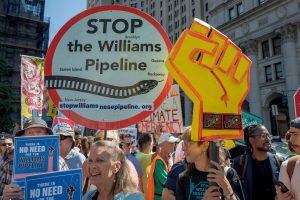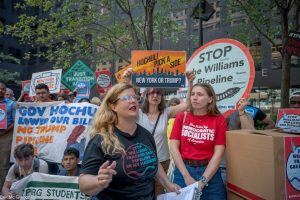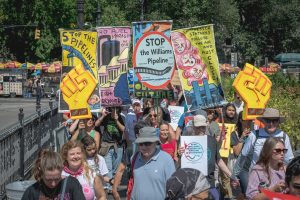
Courtesy Sane Energy Project
Hochul, Trump Support Draws Fire Over NESE Gas Project
MOHAMED FARGHALY
mfarghaly@queensledger.com
A proposal to revive a long-rejected fracked gas pipeline through New York Harbor is once again drawing fierce opposition from environmental advocates, lawmakers, and community organizers who say the project would violate state climate laws, raise costs for residents, and poison local waterways.
The Northeast Supply Enhancement project, known as NESE, would build a 37-mile pipeline stretching from New Jersey to an existing pipe south of the Rockaways. Originally proposed by Williams Companies, the project has been rejected three times by New York’s Department of Environmental Conservation, most recently in 2020, for its potential to harm water quality in Raritan Bay and New York Harbor.
But with Gov. Kathy Hochul and former President Donald Trump signaling support for reviving the plan, critics say the fight is far from over.
“We have been successfully defeating fossil fuel infrastructure projects in New York State for about 15 years, and one of those projects that we have defeated is the Williams Transco proposal to build the Northeast Supply Enhancement pipeline,” said Kim Fraczek, director of the Sane Energy Project, a grassroots group leading opposition efforts.
The group argues the project would cost New Yorkers billions while delivering little benefit to everyday residents. “It would end up saddling National Grid customers, who’s the sole named customer to the Williams pipeline, with $3.2 billion in added costs over 15 years, and this is for fracked gas delivery that wouldn’t actually even be slated to go to the customers paying for it,” Fraczek said.
Instead, Fraczek said, National Grid has indicated the gas would likely go to the wholesale power market to meet demand from growing energy users like AI data centers. “They shouldn’t be mixing up the AI data centers with gas customers,” she said.
Environmental concerns remain central to the opposition. State regulators have consistently ruled the project violates the Clean Water Act, warning it could churn up toxins that have settled in the harbor for decades. “It would poison our beaches. It would poison fisheries. It would poison marine life, and then it would charge us all this money that we don’t need,” Fraczek said.
Advocates have also questioned Hochul’s climate record, arguing that approving NESE would undermine New York’s landmark 2019 climate law. “Governor Hochul has really back slid on a lot of promises that she’s made, and she’s also claims that she doesn’t need to follow our law,” Fraczek said. “She should be saying no. We have 131 legislators on record telling her to say no.”

Supporters of the Williams/NESE pipeline argue that it would strengthen New York’s energy reliability at a time of rising demand, particularly as new industries like AI data centers require more power. Backers also say the project could create jobs during construction and provide a stable supply of natural gas to help meet peak winter heating needs. They contend that without projects like NESE, the region could face higher energy costs and potential shortages as the state transitions away from fossil fuels.
The fight against NESE has gained new political momentum in recent days after Democratic mayoral nominee Zohran Mamdani publicly opposed the project on Instagram. Fraczek welcomed his stance, noting his past work with Sane Energy Project on renewable energy campaigns. “We were thrilled when he came out in opposition to the Williams pipeline. His record already indicates he does care very much about the environment, about climate and about affordability, and this pipeline would violate all three of those things,” she said.
If elected mayor later this year, Zohran Mamdani could significantly shape the city’s stance on the Williams/NESE pipeline by reinforcing opposition at the municipal level and aligning City Hall with advocates pressing Hochul to reject the project. Mamdani has built his platform on affordability, climate action, and public renewables, and groups like the Sane Energy Project see him as a potential ally in ensuring local climate laws are enforced. His leadership could add political weight to the campaign against the pipeline, signaling that New York City will not support fossil fuel expansion and instead prioritize investments in renewable energy and compliance with Local Law 97.
Sane Energy Project and allied groups have ramped up pressure on Hochul’s office, delivering more than 13,000 new public comments against the pipeline in recent weeks. “We don’t want to pay to be poisoned,” Fraczek said. “Our bills should not go up to pay for a toxic project that wouldn’t even see any benefit to everyday New Yorkers.”
In the latest update, Sane Energy Project has sent Governor Hochul a newly commissioned report and a joint letter from elected officials and community leaders opposing the Williams NESE Pipeline, which has been rejected three times over the past eight years. The report, released by The Institute for Energy Economics and Financial Analysis (IEEFA), highlights the pipeline’s economic and environmental threats, including a $1.25 billion cost to Downstate ratepayers, no creation of permanent jobs in New York, a fabricated gas shortage claimed by National Grid, violations of the state’s climate law (CLCPA), and higher electricity prices. The letter, signed by figures including City Comptroller Brad Lander, State Senator Liz Krueger, and Assemblymember Khaleel Anderson, urges Hochul to reject the pipeline once again and was also sent to Commissioner Amanda Lefton and PSC Chair Rory Christian.
The group is urging residents to call or email the governor’s office directly. “That’s the most important thing. She is the number one decision maker on this right now. And we definitely need all New Yorkers to say that we don’t want to pay to be poisoned,” Fraczek said.



